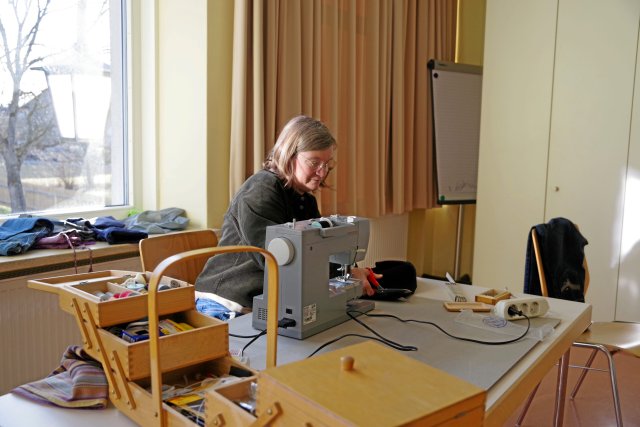Sustainability | New life for old things
The community center of Aying, a small community in the Munich area, stands right next to the town hall, diagonally across from a church steeple. The large hall on the first floor is bustling on a Sunday afternoon in early summer. While several visitors to the left are enjoying coffee and cake, on the right, three men and a woman are busy unscrewing electrical appliances and shortening trousers. Thomas Wiedemann sits by the door and says: "I think it's a good idea to repair broken things instead of throwing them away." The 62-year-old is the organizer of the "Repair Café" held here.
Wiedemann receives the items to be repaired, attaches a note to them, and places them on a table behind him. Several items are already waiting to be repaired. Note No. 15: "Toaster won't stay down." Note No. 8: "Vacuum cleaner, switch broken." Note No. 11: "Food processor broken. Won't close." Each broken appliance receives a tracking number and a brief description of the problem. The appliance and the note are then picked up by the Repair Café specialists, brought to a workbench, and repaired.
Take Jörg von Styp, for example. The 59-year-old electrical engineer is tinkering with an old television. The set has a built-in DVD player, and it's jammed. Von Styp is thinking for a moment. "I'm a bit perplexed," says the engineer, frowning.
He is one of twelve volunteers who have been running the Repair Café for a good two years. Some repair things, others make coffee and bake cakes. The "customers" can enjoy both at tables while they wait for their items to be repaired—or not. Between 20 and 30 people attend the event at the community center, which takes place every three months.
Engineer von Styp lives in the community; he married into a farming family. And because he's always enjoyed tinkering, he came across the Repair Café. The television and broken DVD player he's currently working on come from a discount store chain and are about 15 years old. "The older, the better," says the engineer. At least when it comes to repairs. Because with modern devices, that's often no longer possible.
On the checklist that comes with the TV, you can check three options: "Repair successful," "Not quite. Recommendation?", and "No. Reason?" It's not yet clear what Styp will enter here. Unlike the hot ironer he previously used to iron fabrics. Only the electrical contacts were dirty. After they were cleaned, the ironer worked again.
At the next table, Carla Spindler sits in front of her sewing machine, which she brought from home, shortening a pair of pants. "Seven centimeters," she says, measuring. Next to her is a box filled with thread and needles. Spindler isn't a seamstress, but simple sewing is no problem for her. "We learned how to use a sewing machine in school," she explains. Although she knows: "Jeans are rather difficult."

In addition to electrical appliance repairs and a sewing service, there's also the option to bring your bike. A bike mechanic has laid out his tools in front of the community center, inspecting brakes and gear shifts. Bicycles, vacuum cleaners, game consoles, radios, record players, pants—the range of items brought in for repair is wide. Now, an elderly lady is standing with Thomas Wiedemann, carrying several cell phones. "Which one is broken?" he asks. Actually, none of them, but the SIM cards need to be changed.
Such repair facilities first appeared in the Netherlands in 2009. The Repair Café in Aying emerged from a so-called "future workshop" run by the municipality (formerly known as "Agenda 21"). In this workshop, citizens explore environmental and sustainability issues in four areas: energy, mobility, nature conservation, and consumption. The Repair Café is located in the latter area. Wiedemann placed an appeal in the municipal newsletter, and the project was launched. He received support from the municipality—which provided the space—and from the local adult education center.
There are now around 250 Repair Cafés in Bavaria, from Aschaffenburg to Murnau. They are designed to help prevent waste and protect the environment and resources. There are approximately 1,200 such repair facilities nationwide. A funding program from the Federal Ministry for the Environment provides up to €3,000 for organizations organized as non-profit associations. As the program progresses, non-organizational organizations will also be supported. A total of €3 million in funding is available.
In Berlin, the Senate also supports the repair of electrical appliances such as washing machines and vacuum cleaners. Repairs to all common household appliances are subsidized with up to 200 euros, and repairs can be carried out in both commercial and non-commercial repair shops, such as Repair Cafés . In 2024, 7,500 such repair applications were submitted in Berlin.
Back to electrical engineer von Styp. He found the defect in the DVD player. A plastic gear had broken, blocking the DVD tray. Due to a lack of spare parts, nothing could be done. "We can't repair everything, but in most cases we can at least determine where the problem lies," says organizer Wiedemann.
nd-aktuell



